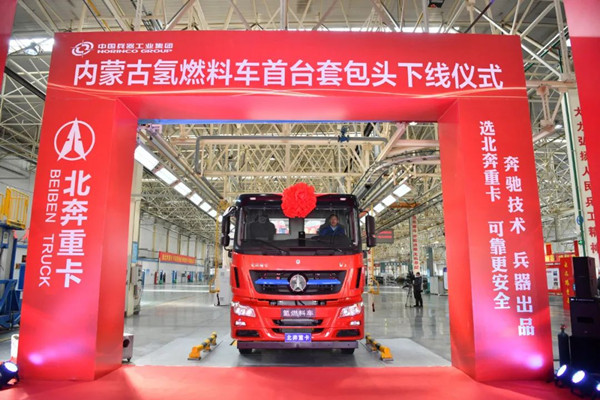N China's Baotou promotes carbon reduction efforts

A new vehicle rolls off the production line at Beiben's plant on March 1. [Photo/Baotou Daily]
The city of Baotou in North China's Inner Mongolia autonomous region is to increase its carbon reduction efforts and lead the way in green development, according to Inner Mongolia Daily.
The city has formulated an "Implementation Plan for Deeply Promoting Carbon Peak and Carbon Neutrality and Accelerating the Construction of a Green and Low-Carbon City", and formed an initial action plan in 10 key areas.
Baotou proposed in its 14th Five-Year Plan (2021-25) to highlight the construction of "four bases, two centers, one highland and one system."
The "four bases" include the construction of an important modern energy industry base in the country, with an industrial output of more than 100 billion yuan ($15.36 million).
Earlier, on March 1, Beiben Trucks Group Co, a Chinese heavy-duty truck producer, launched a new vehicle powered by 100-kilowatt hydrogen fuel cells.
The vehicle's hydrogen storage cylinders use proton-exchange membrane fuel cells independently developed by Shanghai Jiao Tong University. They can operate in extremely cold conditions as low as minus 30 degrees Celsius.
Baogang Group, the largest iron and steel manufacturer in Inner Mongolia autonomous region, issued a green bond focusing on carbon neutral projects on the Shanghai Stock Exchange recently - the first of its kind in the region's steel industry.
The issuing value of the bond is 500 million yuan and it has a term of five years. More than 70 percent of the money raised will be used for projects to reduce carbon emissions.
The project is mainly intended to convert recycled blast furnace gases into electricity, a system which can cut emissions and save energy. It is expected to reduce coal consumption by 131,900 metric tons and reduce carbon dioxide emissions by 88,400 tons annually.
In 2021, Baotou will continue to improve the integrated industrial chain of photovoltaic and wind power equipment R&D, design, and production, and promote the first phase of 1.6 million kilowatt wind power projects in the comprehensive application of a renewable energy demonstration zone.
